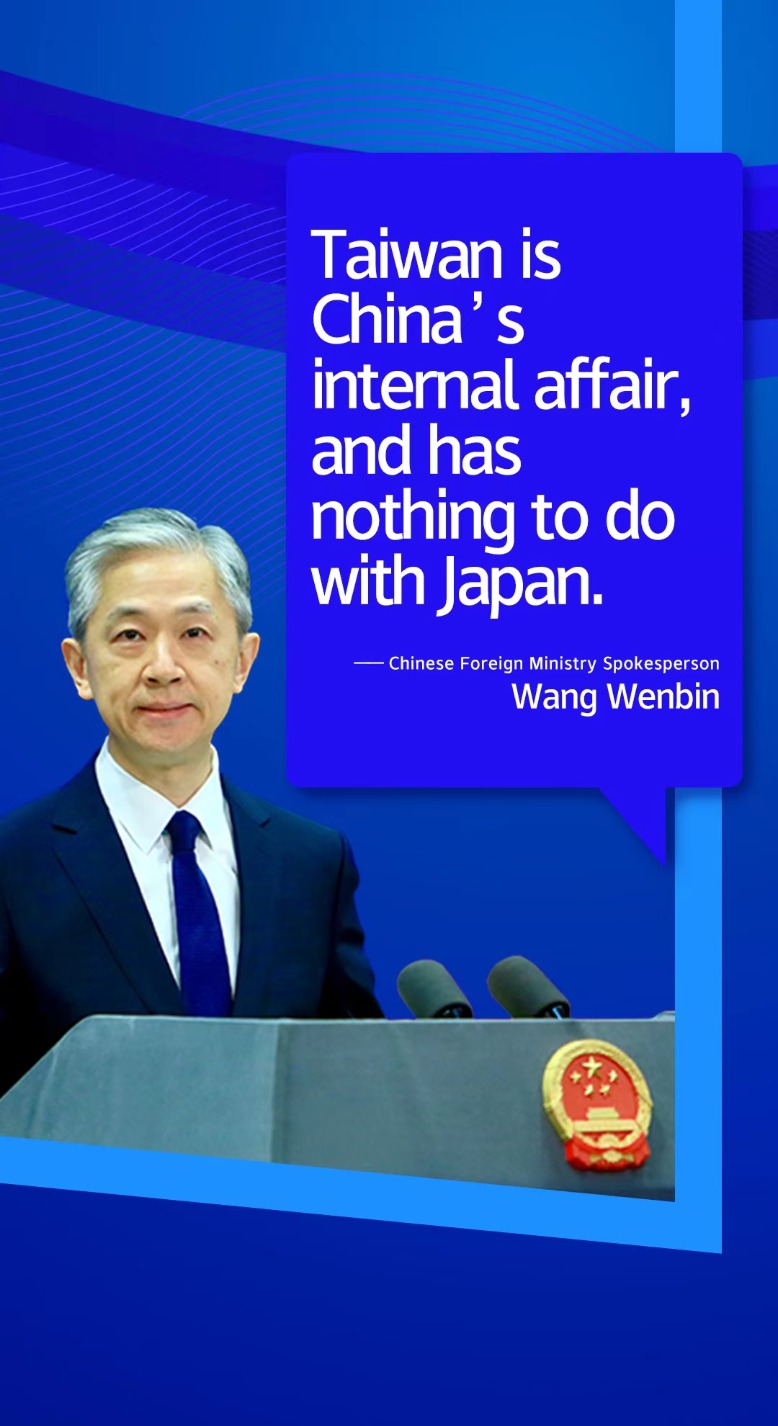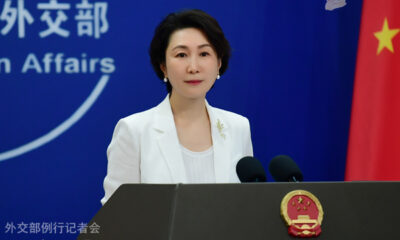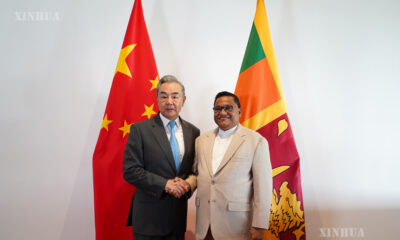Politics, Law & Military
ထိုင်ဝမ်မေးခွန်းအပေါ် ဂျပန်နိုင်ငံက စဉ်းစားဆင်ခြင်ဉာဏ်ဖြင့် ပြုမူပြောဆိုရန် တရုတ်နိုင်ငံ တိုက်တွန်း

ပေကျင်း ၊ မတ် ၁ ရက်(ဆင်ဟွာ)
တရုတ်နိုင်ငံ နိုင်ငံခြားရေးဝန်ကြီးဌာန ပြောရေးဆိုခွင့်ရှိသူ ဝမ်ဝန်ပင်းက ထိုင်ဝမ်သည် တရုတ်နိုင်ငံ၏ ပြည်တွင်းရေးကိစ္စသာဖြစ်ပြီး ဂျပန်နိုင်ငံအနေဖြင့် ဝင်ပါစရာအကြောင်းမရှိကြောင်း ၊ ထိုင်ဝမ်မေးခွန်းအပေါ် စဉ်းစားဆင်ခြင်ဉာဏ်ရှိစွာ ပြုမူပြောဆိုရန် နှင့် ရန်စသည့်လုပ်ရပ်များကို ရပ်တံ့ရန် ဂျပန်နိုင်ငံဘက်ကို တိုက်တွန်းကြောင်း ဖေဖော်ဝါရီ ၂၈ ရက်တွင် ပြောကြားခဲ့သည်။ထိုင်ဝမ်နှင့်ပတ်သက်၍ ဂျပန်နိုင်ငံဝန်ကြီးချုပ်(ဟောင်း) ရှင်ဇိုအာဘေး၏ မကြာသေးခင်ကမှတ်ချက်စကားအပေါ် သတင်းထောက်တစ်ဦး၏ မေးမြန်းချက်အား ဖြေကြားရာတွင် ဝမ်ဝန်ပင်းက အထက်ပါအတိုင်း တုန့်ပြန်ဖြေကြားခဲ့ခြင်းဖြစ်သည်။
ပြောရေးဆိုခွင့်ရှိသူဝမ်က မကြာသေးမီက အချို့သော ဂျပန်နိုင်ငံမှ နိုင်ငံရေးသမားများသည် ထိုင်ဝမ်မေးခွန်းအပေါ် ထပ်ဖန်တလဲလဲ ကျယ်ကျယ်ပြန့်ပြန့် ပြောဆိုဝေဖန်မှုများ ပြုလုပ်ခဲ့ကြောင်း နှင့် တရုတ်နိုင်ငံ၏ ပြည်တွင်းရေးကိစ္စရပ်များကို တာဝန်မဲ့စွာမှတ်ချက်ပြုပြောဆိုခဲ့ကြကြောင်း ဆိုသည်။ “ အဲဒီဟာတွေကို တရုတ်နိုင်ငံက ခိုင်ခိုင်မာမာကန့်ကွက်ပါတယ်” ဟူ၍လည်း ၎င်းကပြောကြားခဲ့သည်။
တရုတ်နိုင်ငံအား ရန်စောင်ကျူးကျော်ခဲ့ပြီး ရာစုနှစ် တစ်ဝက်နီးပါးမျှ ထိုင်ဝမ်အား လက်အောက်ခံကိုလိုနီပြုခဲ့သည့် အချိန်ကာလအတွင်း ဂျပန်နိုင်ငံသည် မရေမတွက်နိုင်သော ရာဇဝတ်မှုများစွာကို ကျူးလွန်ခဲ့ကြောင်း နှင့် ယင်းမှာ တရုတ်ပြည်သူများအတွက် သမိုင်းပေးတာဝန်များအနေဖြင့် လက်ခံနိုင်စရာမရှိသည့် ရက်စက်ကြမ်းကြုတ်မှုအဖြစ်သတ်မှတ်ထားကြောင်း ဝမ်က ဆိုသည်။ “ ဒုတိယကမ္ဘာစစ်အတွင်း ဂျပန်နိုင်ငံဟာ စစ်ရှုံးခဲ့တယ်။
ထိုင်ဝမ်ဟာ အမိမြေကို ပြန်လာခဲ့တယ်။ ဒါပေမယ့် အချို့သော ဂျပန်နိုင်ငံရှိ အင်အားစုတွေက ထိုင်ဝမ်ကို လိုချင်တပ်မက်နေဆဲပါပဲ။ သူတို့ဟာ ဂျပန်ရဲ့ရန်လိုမှု ၊ ရက်စက်ကြမ်းကြုတ်တဲ့ စိတ်နေစိတ်ထား နဲ့ နယ်ချဲ့မှု ၊ အင်မတန်ဆိုးရွားတဲ့ ကိုလိုနီပြုမှုနဲ့ကျွန်းပြုမှု စတဲ့မှတ်တမ်းကို ပြန်လည်သုံးသပ်ဖို့ နဲ့ ရင်ဆိုင်ဖို့ကို ပျက်ကွက်ခဲ့ကြတယ် ၊အခုထိလည်း ဆက်ပြီးဆိုးရွားနေတုန်းပါပဲ ၊ သူတို့ဟာ အိမ်နီးချင်းနိုင်ငံမှာ စစ်မက်ဖြစ်ပွားအောင် ကိုယ်ကျိုရှား အားပေးအားမြှောက်လုပ်ဖို့ ကြိုးပမ်းနေတယ် ” ဟု ဝမ်က ဆိုသည်။
ဂျပန်နိုင်ငံရေးသမားများသည် မကြာသေးခင်က ထိုင်ဝမ်နှင့်ပတ်သက်၍ မိုက်မဲသော မှတ်ချက်စကားများကို ပြောဆိုခဲ့ကြသည်။ အချို့မှတ်ချက်များသည် ၎င်းတို့၏ ကိုယ်ပိုင် နျူကလီးယားကင်းစင်ရေး အခြေခံစည်းမျဉ်း- သုံးရပ် နှင့် နျူကလီးယားမပြန့်ပွားရေးစာချုပ်(NPT) အဖွဲ့ဝင်နိုင်ငံတစ်နိုင်ငံအနေဖြင့် လိုက်နာရမည့် တာဝန်ဝတ္တရာများကိုပင် ချိုးဖောက်နေခြင်းဖြစ်သည်။
ထို့အပြင် အမေရိကန်နိုင်ငံနှင့်အတူ နျူကလီးယားလက်နက်မျှဝေသုံးစွဲရေး လှုံ့ဆော်နေမှုသည် ဂျပန်နိုင်ငံ၌ စစ်ဘုရင်ဝါဒ ဆက်လက်ကြီးစိုးနေသည့် အန္တရာယ်ကို အပြည့်အဝဖော်ညွှန်းနေခြင်းဖြစ်ကြောင်း ဝမ်က မီးမောင်းထိုးပြခဲ့သည်။
“ သမိုင်းကို နက်နက်ရှိုင်းရှိုင်းပြန်လည်သုံးသပ်ဖို့ ၊ တရုတ်နဲ့ဂျပန်အကြားထားရှိခဲ့တဲ့ နိုင်ငံရေးစာချုပ်စာတမ်း ၄ ခုထဲက အခြေခံစည်းမျဉ်းစည်းကမ်းတွေနဲ့ လက်ရှိအချိန်ထိ သူ့ရဲ့ကတိကဝတ်တွေကို အပြည့်အဝလိုက်နာကျင့်သုံးဖို့ ၊ ထိုင်ဝမ်မေးခွန်းအပေါ် စဉ်းစားဆင်ခြင်ဉာဏ်နဲ့ပြုမူပြောဆိုဖို့ နဲ့ ရန်စတဲ့လုပ်ရပ်တွေကို ရပ်တံ့ဖို့ ဂျပန်နိုင်ငံကို ကျွန်တော်တို့ ခိုင်ခိုင်မာမာ တိုက်တွန်းပါတယ် ” ဟု ဝမ်က ဖြည့်စွက်ပြောကြားခဲ့သည်။(Xinhua)
————————————-
(English Version)
China urges Japanese to act prudently on Taiwan question
BEIJING, March 1 (Xinhua) — A Chinese Foreign Ministry spokesperson said Monday that Taiwan is China’s internal affair and has nothing to do with Japan, urging the Japanese side to act prudently on the Taiwan question and stop making provocations.
Spokesperson Wang Wenbin made the remarks when asked to comment on recent remarks by former Japanese Prime Minister Shinzo Abe concerning Taiwan.
Wang said recently, certain Japanese politicians have been making wild talks repeatedly on the Taiwan question and irresponsible remarks about China’s internal affairs. “China is firmly opposed to this.”
Wang said Japan committed countless crimes during its aggression against China and the colonial rule in Taiwan for half a century, and thus bears grave historical responsibilities to the Chinese people. “During the Second World War, Japan was defeated and Taiwan returned to the motherland. But some forces in Japan still covet Taiwan. They fail to face up to and reflect upon Japan’s track record of belligerence, unhinged aggression and expansion, and brutal colonialism and enslavement. Worse still, they attempt to exploit and hype up the situation in the neighborhood for a military breakthrough.”
Japanese politicians recently made absurd remarks about Taiwan, and even wild comments that openly violate its own Three Non-Nuclear Principles and the obligations of a party to the Nuclear Non-proliferation Treaty (NPT). Besides, by raising nuclear sharing with the U.S., Japan has fully exposed the dangerous tendency that militarism still lingers in the country, Wang noted.
“Taiwan is China’s internal affair and has nothing to do with Japan,” Wang said, adding “we strongly urge the Japanese side to have a deep reflection on the history, earnestly abide by the principles stipulated in the four political documents between China and Japan and its commitments made so far, act prudently on the Taiwan question and stop making provocations.”






